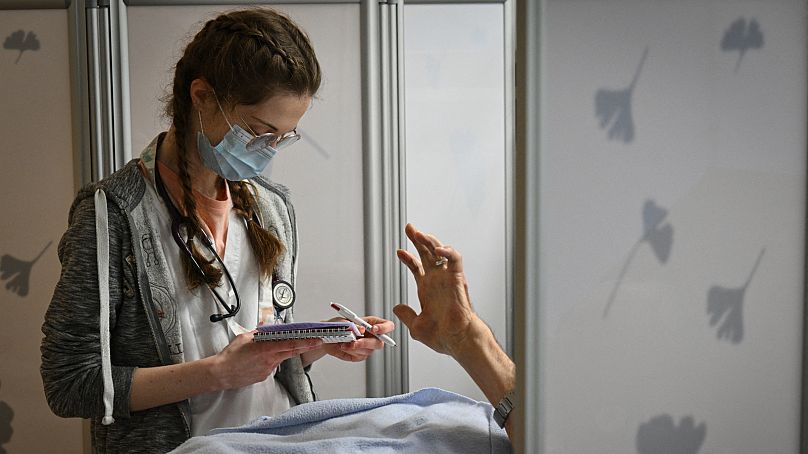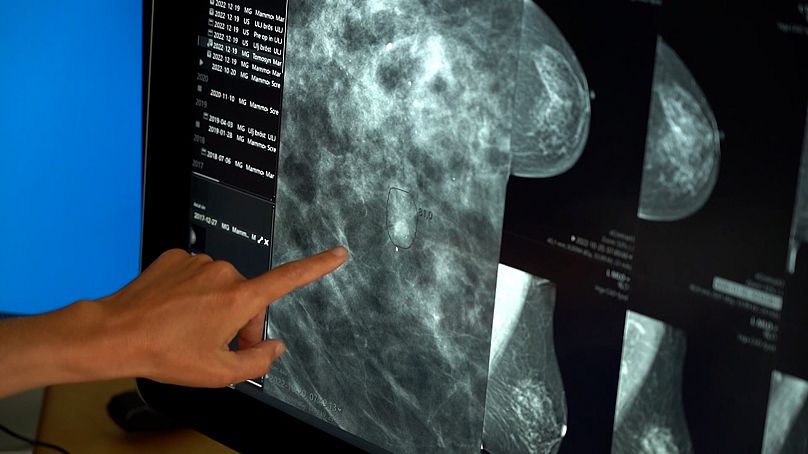Experts say AI is not there to replace health workers but rather could help to automate some of the more administrative tasks that fall on them.
 ADVERTISEMENT
ADVERTISEMENT
As a growing number of research studies analyse the use of artificial intelligence (AI) in detecting diseases or interpreting patient data, these technologies could soon become more widely available in doctors’ offices.
But how could that change the workload for doctors and nurses? It’s a question that many experts in the field have been considering as European countries face health worker shortages.
“We do know we have a huge health workforce crisis and shortage in terms of when one looks at the demographic trends and looks at the numbers of health workers that are going to be available in the coming years,” Natasha Azzopardi-Muscat, the World Health Organization (WHO) European regional office’s director of country health policies and systems, told Euronews Next.
In many European countries, populations are ageing, and this will have consequences on the workforce, with many general practitioners (GPs), for instance, retiring in the coming years.
A WHO report last year found that 40 per cent of medical doctors are close to retirement age in around one-third of countries across Europe and Central Asia, calling the situation a "ticking time bomb".
At the same time, health workers have gone on strike in several countries to demand higher pay and fewer overtime hours amid shortages in certain regions and in the public sector.
Could AI help to ease the workload for doctors?
Azzopardi-Muscat says that some health workers find that digital technologies have placed “an additional burden on them” but that they should rather “release time for health workers that support them in their clinical decision-making”.
These tools could free up time for doctors for “face-to-face interactions, for those human interventions where no digital solution is going to be able to provide the empathy and the care that is needed,” she added.
The area where it could flourish more quickly, experts say, is on the administrative side of healthcare.
Some AI platforms could help to automate tasks such as booking appointments, scheduling in hospitals, communicating diagnoses, and coordinating patient follow-up.
“What we hear most about is more in the diagnostic space, but I really do think that the administrative task space is even more promising, in part because it's offloading work that is not necessarily, at the highest level of one’s training or capabilities,” Wiljeana Jackson Glover, a professor of health innovation and entrepreneurship at Babson College in the US, told Euronews Next.
“It's taking those tasks off of their plate in order for them to focus more on triage or diagnostics or clinical care,” she added.
Using AI for administrative tasks might not require the same regulatory approval as diagnostic AI systems as well, making it easier to incorporate them into workflows.
Bart de Witte, CEO of the Hippo AI Foundation which focuses on open-source medical AI, told Euronews Next that in the near future, doctors could talk to machines instead of typing out their own notes.
“There are all these new large language models which allow us to talk to machines in a very natural way,” he said.
“We had hospitals that went paperless, but can we go from paperless to keyboardless?”
What are the challenges in implementing AI technologies in healthcare?
Tom Davenport, a professor of IT and management at Babson College who wrote a book about the use of AI in healthcare, says that these innovations have been slow to move into “clinical practice” at the moment.
“The good reasons are obviously, you know, health care is a life or death matter and you want to make sure that everything works well before you make it a standard part of treating patients,” he said.
“But some of the bad reasons are, there are lots of regulatory approvals that have to happen, and there are sometimes reimbursement issues related to using these systems”.
He added that many AI technologies are “standalone”, meaning for a particular diagnosis or treatment you have a separate AI system which makes it more difficult to employ clinically.
Most of the AI systems currently approved by authorities involve using the technology to analyse radiological images.
A recent Swedish study, for instance, found that AI-assisted breast cancer screening detected 20 per cent more cancers compared with a double reading of mammograms by two radiologists.
Scientists warned however that it remained to be seen if AI contributed to overdiagnosis, something that is still being studied.
Some international agencies including the United Nations have called for more regulation of AI, with the WHO warning that the speed of AI’s sophistication has outpaced authorities’ capacity to review it.
“We're going to see an explosion of new tools and new platforms, new solutions coming out every day,” Alain Labrique, the World Health Organization (WHO)’s director of digital health and innovation, told Euronews Next.
“It's where the risk and the closeness to patients require regulatory oversight that we need to be carefully paying attention to those technologies to ensure that they are safe, they are confidential, they are dealing with patient privacy and that they're not putting people at risk.”
Could AI lead to job loss in healthcare or other changes?
“Job loss is certainly more likely in administrative jobs than it is in clinical jobs,” said Davenport.
“In many clinical areas, we have big shortages of clinicians now, doctors and nurses, so it's unlikely that we're going to have people being laid off in the clinical sector anytime soon,” he said.
Jobs that involve data and reading notes might experience some job loss but he doesn’t think it will be huge.
Glover, who has written on this topic with Davenport, added that it is “more about augmenting the work that administrative staff do” and that there will be additional roles to handle the nuances the algorithm won’t be able to handle.
In her view, there’s still some time.
“We're at least a decade away from all of it being automated, probably more than that,” Glover added.
But she thinks that “there’s great opportunity” for getting people prepared for working with these new tools and informing their use as they’re being implemented.












